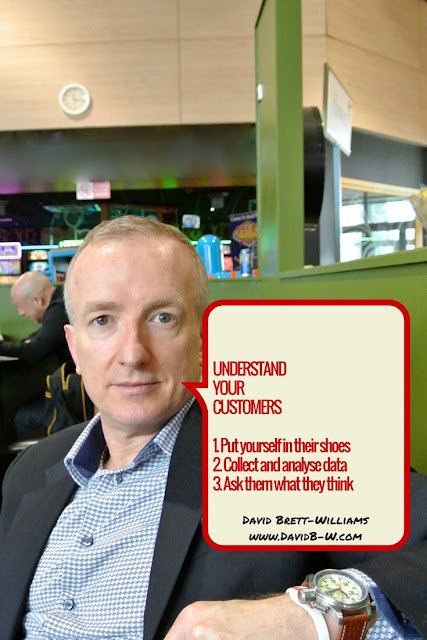Understanding customers is
the key to giving them good service. To give good customer service you must
deliver what you promise. But great customer care involves getting to know your
customers so well that you can anticipate their needs and exceed their
expectations.
To understand your
customers well, you need to be attentive to them whenever you are in contact
with them. The potential rewards are great: you can increase
customer loyalty and bring in new business through positive word-of-mouth
recommendation.
There are three main ways
to understand your customers better:
- Put yourself in their shoes and try and look at your business from their point of view.
- Collect and analyse data in order to shed light on their buying behaviour.
- Simply to ask them what they think.

Put yourself in their shoes
Understanding customers
requires you to take a hard look at the points at which your customers have
contact with your business (customer touch points). These include meetings and
visits, phone calls, correspondence and deliveries. Do your premises look
scruffy, is your receptionist unfriendly or do your phones ring off the hook?
All these things can lead to a customer feeling disappointed.
The most common customer
complaint is being kept waiting. If you're slow to return calls or fulfill
orders, then you're in danger of losing customers. Above all, customers want
you to deliver what you have promised and meet or even surpass their expectations.
As a small business, you
can offer a personal service. If you do simple things like remember their name
and recall your last conversation with them, you will have pleasantly surprised
them. There is also a great likelihood they will tell their friends about the
service you provide.
Understanding your
customers and improving your service must be a priority throughout your
business. Everyone from the front desk to the delivery staff should focus on
exceeding customer expectations.
Collect and analyse data
Your database or customer relationship management system (CRM)
holds valuable information about your customers that will help you to
understand their needs.
The data you hold on your
customers can tell you a lot. Look for patterns so you can see when your
customers typically make orders. You can also use the data to analyse your
performance. Check how quickly you're responding to orders or delivering goods.
CRM systems are more
sophisticated than simple mailing lists. Because they hold information about
customer behaviour and preferences they can improve customer satisfaction and
retention. They can help you to identify customer needs more effectively,
allowing you to up-sell and cross-sell,
increasing profitability.
Ask them what they think
Conduct a customer satisfaction survey and you will
make your customers feel valued. You will also gain valuable insights. But
don't bother asking for feedback if you are not prepared to make changes. When
you do make improvements, tell your customers what you have done as a result of
their feedback.
Customer surveys can tell
you things you may not know, including human factors such as staff behaviour.
Not everyone complains when they are dissatisfied. Instead, they tell their
friends about their bad experience and take their business elsewhere. Unless
you proactively consult your customers, you may never discover where you are
going wrong.
As well as asking for
feedback, set up a customer contact programme to ensure you keep in touch with
your clients. A good customer contact
strategy will allow you to listen to your customers and tell them more
about what you offer.
I hope this helps your business be outstanding.
One more thing before you go......I would like you to do one important thing for me - spread the word about this article.
That is all -
David


No comments:
Post a Comment